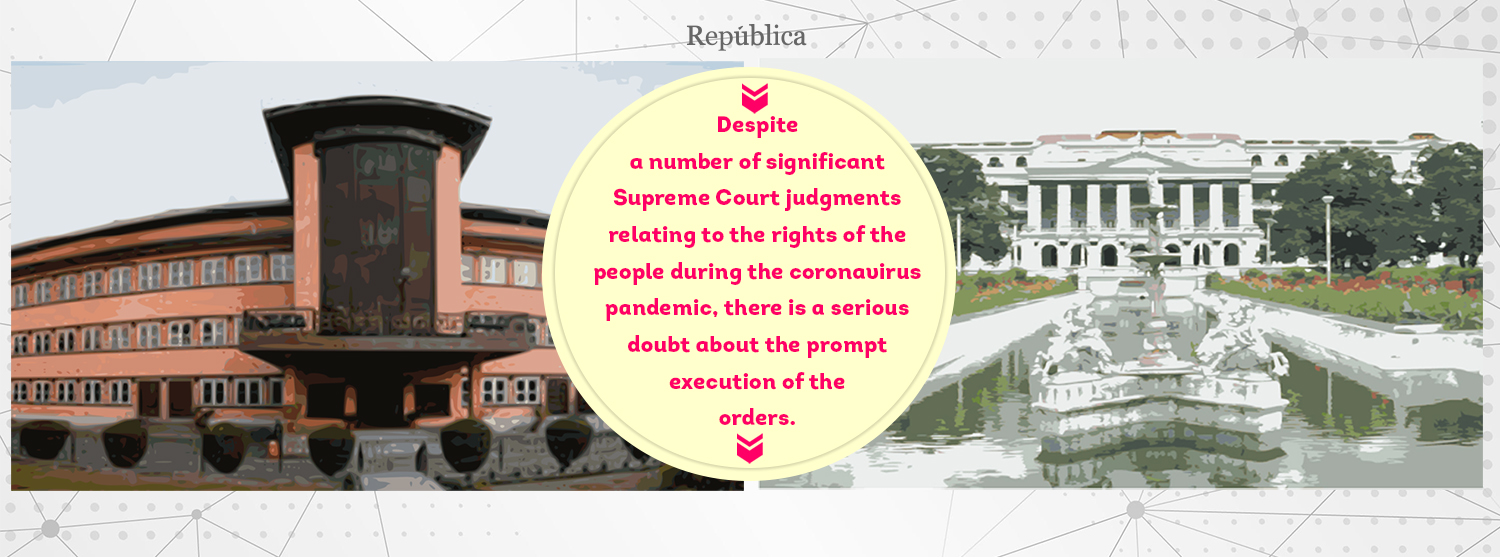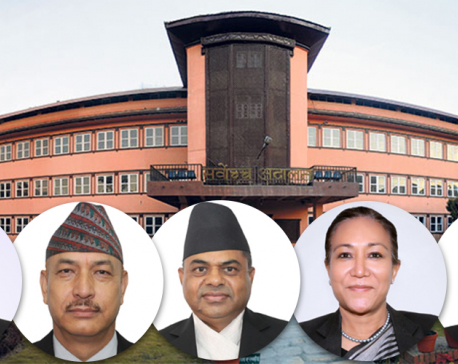
OR
#COMMENTARY
Why is the government ignoring SC’s verdicts on pandemic?
Published On: September 13, 2020 12:05 PM NPT By: Ananta Raj Luitel

KATHMANDU, Sept 13: Despite a number of significant Supreme Court judgments relating to the rights of the people during the coronavirus pandemic, there is a serious doubt about the prompt execution of the orders.
The apex court had directed the executive branch to make public the expenses of state treasury spent in relief during the pandemic, but the government has not yet published the details. The SC’s order was issued some two months ago.
On July 9, a division bench of justices Dr Ananda Mohan Bhattarai and Hari Prasad Phuyal had directed the authorities to make public the details of relief materials distributed to the needy during the lockdown.
It was the first verdict in relation to a PIL filed after the lockdown imposed by the government on March 24. Dozens of public litigations were lodged during lockdown when the judiciary had suspended its regular business.
Advocates Kritinath Sharma, Manish Shrestha, Pratibha Uprety and Santosh Bhandari had filed a petition in the SC, demanding the court order the government to publish details of corona-relief expenses. The petitioners also invoked the Right to Information Act, 2006 (RTI) and the Good Governance Act, 2007 in their petition.
Stating that the petitioners and the people have the right to know the expenses as per Article 27 of the Constitution and Section 3 of Right to Information Act, 2006, the bench had directed the authorities to publish the corona-related expense details.
Though it was the first verdict in relation to a PIL filed after the lockdown, the apex court is yet to make public the final text of the judgment. In a statement, Prime Minister KP Oli had stated that the government spent Rs 800 million until the 23rd day of the lockdown, and he also added that Rs 10 billion was spent in providing relief to the needy people.
In another SC judgment issued in relation to the rights of the vulnerable people, women and children, the apex court has also directed the authorities to enact a comprehensive pandemic law.
On Sept 4, a division bench of Justices Sapana Pradhan Malla and Prakash Kumar Dhungana directed the government to conduct a study to evaluate the sufficiency of the Infectious Disease Act, 1976. And the SC has asked the government, if needed, to enact new laws to address the problems caused by pandemics.
In relation to the petition filed by advocates Roshani Paudel Ghimire and Saroj Krishna Ghimire, the bench also underlined the limitation provisions in relation to domestic violence and stated that the law is inadequate to address the cases during pandemic. The apex court directed the authorities to enact a comprehensive Act to address the problems faced by the women, children and the vulnerable people.
On August 3, in relation to the third pandemic verdict, the SC issued rulings in the name of the executive branch to seriously act to protect the rights of inmates who are extremely vulnerable to coronavirus. A division bench of Justices Sapana Pradhan Malla and Prakash Kumar Dhungana underlined an urgent need to analyze problems faced by the vulnerable inmates –elderdly, women and children, sick and the others.
Analyzing the prevailing laws, international laws and the practices of the rights of the inmates around the world in connection to the pandemic, the bench directed the executive to seriously work on securing the rights of the inmates, either by commuting or remitting their jail sentences, releasing or suspending the jail term of the vulnerable inmates or taking suitable approach.
In the case of Gopal Siwakoti Chintan and others, the apex court had issued interim order to implement the modern sentencing system adopted by the Sentence Determination Act, 2017, but the government did not take the order seriously and the interim order was never executed. However, the final verdict has raised hope in protecting the rights of the inmates during the pandemic.
"The apex court has issued various judgments but the government's response is pathetic," said advocate Manish Kumar Shrestha. "Some instances have proven that the government is not serious about protecting the rights of the individuals."
You May Like This

In a landmark verdict, Supreme Court reinstates House of Representatives (Read the verdict)
KATHMANDU, Feb 23: In a landmark verdict, the Supreme Court has reinstated the dissolved House of Representatives (HoR). ... Read More...

Danger Ahead, Caution Needed!
The rapidly growing public debt in Nepal is a cause for concern, and officials’ assurances that the country can handle... Read More...

Rai appointed as Nepal's Permanent Representative to New York
KATHMANDU, Jan 8: The government has appointed Amrit Bahadur Rai as Nepal's Permanent Representative to United Nations in New York. Read More...










Just In
- NRB introduces cautiously flexible measures to address ongoing slowdown in various economic sectors
- Forced Covid-19 cremations: is it too late for redemption?
- NRB to provide collateral-free loans to foreign employment seekers
- NEB to publish Grade 12 results next week
- Body handover begins; Relatives remain dissatisfied with insurance, compensation amount
- NC defers its plan to join Koshi govt
- NRB to review microfinance loan interest rate
- 134 dead in floods and landslides since onset of monsoon this year








Leave A Comment